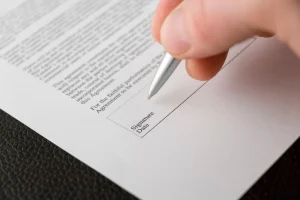Have you ever thought about what is an affidavit of proof of ownership? Being that it is very important, one needs to have a good understanding of it and what information is included in it.
An affidavit of proof of ownership in Nigeria is a legal document that serves as a sworn statement by an individual declaring ownership of a property, asset, or item.
This affidavit is typically used in situations where there is no formal or registered proof of ownership, or when such documentation has been lost or damaged.
It is a necessary legal instrument in Nigeria, especially in situations involving property disputes, transfer of ownership, or court proceedings.
This document is widely recognized in Nigerian courts, government agencies, and financial institutions as a valid form of ownership verification.
As you read on, we will delve into the various aspects of an affidavit of proof of ownership, its importance, the process of obtaining one, and how it can be used in Nigeria.
READ ALSO:
- Who Issues Proof of Ownership in Nigeria?
- How to Get a Proof of Ownership Certificate
- Easy Ways to Renew Proof of Ownership Certificate
- Steps to Get a Proof of Ownership Certificate
- Who Has the Right to Check Vehicle Documents in Nigeria?
Why an Affidavit of Proof of Ownership Important in Nigeria
The affidavit of proof of ownership is important in Nigeria due to the country’s complex property laws and often unclear property documentation systems. Many people, particularly in rural areas, may not have formal title deeds or other forms of legal proof of ownership for land or property.
In such cases, an affidavit serves as an alternative to verify that a person is indeed the rightful owner of an asset.
Below are a few key reasons an affidavit of proof of ownership is important:
- Proof of Ownership in Disputes: If there is a dispute over the ownership of property or assets, an affidavit can serve as legal evidence in court to assert ownership.
- Property Transfers: When transferring ownership of property, especially in the absence of formal title deeds, an affidavit can be used to affirm the legitimacy of the transfer.
- Lost or Damaged Documents: If ownership documents are lost or destroyed, an affidavit provides a legal avenue for the owner to reassert their rights over the property.
- Legal Compliance: Some transactions, including those involving banks or government agencies, may require an affidavit to comply with legal procedures and regulations.
What Information is Included in an Affidavit of Proof of Ownership?
An affidavit of proof of ownership is a detailed legal document that includes important information about the owner, the property or asset in question, and the circumstances under which the affidavit is being made. It typically contains the following elements:
- Declarant’s Information: This section identifies the person making the affidavit (the declarant). It includes their full name, address, occupation, and other relevant personal information.
- Description of the Property: The affidavit must clearly describe the property or asset. This description includes details like the type of property (e.g., land, car, or personal assets), location, size, registration numbers (if applicable), and other identifying characteristics.
- Statement of Ownership: The declarant swears under oath that they are the rightful owner of the described property. This section should also outline how the ownership was acquired, whether through purchase, inheritance, or other means.
- Circumstances Requiring the Affidavit: The affidavit explains why this proof of ownership is being made. It could be due to the absence of a formal title deed, a lost document, or for a property transaction. It should provide a clear rationale.
- Sworn Oath: The document must include a sworn oath taken by the declarant in the presence of a commissioner for oaths, notary public, or any other authorized legal official. This makes the affidavit legally binding.
- Witness Information: Affidavits often include witness information, which further validates the statement. Witnesses should be people who can affirm the ownership claim.
When is an Affidavit of Proof of Ownership Needed?
There are various instances where an affidavit of proof of ownership is necessary. While it is not a replacement for formal ownership documents, it can serve as an interim or complementary measure in specific situations. Below are some of the common instances where it is needed:
- Property Disputes: In Nigeria, property disputes are quite common, particularly in rural areas where land ownership is often not formally documented. In such cases, an affidavit of proof of ownership can help establish who the rightful owner is.
- Inheritance Cases: When a person inherits property but lacks formal documentation, an affidavit can be used to demonstrate that the asset was inherited legally. This is especially important in Nigeria, where property inheritance laws vary based on cultural and regional practices.
- Lost Ownership Documents: If a property owner loses their original title deed or other proof of ownership documents, they may need to provide an affidavit to government authorities or financial institutions to restore ownership records or complete transactions.
- Sale or Transfer of Property: During the sale or transfer of a property, the buyer or seller may be required to provide an affidavit of proof of ownership, particularly if there are discrepancies or missing documents. This assures the buyer or the legal system that the seller is the legitimate owner.
- Court Proceedings: If ownership of property becomes part of a legal case, an affidavit can serve as sworn testimony and evidence of ownership. This document can be critical in securing a favorable ruling in court.
READ ALSO:
- Where Can I Get a Certificate of Ownership in Nigeria?
- Steps to Get Affidavit for Loss of Car Documents in Nigeria
- Vehicle Registration Documents
How to Obtain an Affidavit of Proof of Ownership in Nigeria
Obtaining an affidavit of proof of ownership in Nigeria is a straightforward legal process. However, it requires adhering to specific legal requirements to ensure that the affidavit is valid and legally binding. Below are the steps involved in obtaining an affidavit of proof of ownership:
- Draft the Affidavit: The first step is to draft the affidavit, either on your own or with the help of a legal practitioner. The affidavit should include all the necessary information such as personal details, a description of the property, a sworn statement of ownership, and the reason for the affidavit.
- Visit a Commissioner for Oaths or Notary Public: Once the affidavit has been drafted, it must be signed in the presence of a commissioner for oaths or a notary public. These officials are authorized to witness the signing and administer oaths. Their role is to ensure that the affidavit is legally valid.
- Sign the Affidavit: You will be required to sign the affidavit in the presence of the commissioner for oaths or notary public. It is important to ensure that the document is signed willingly and without any coercion.
- Pay the Required Fees: There are nominal fees associated with obtaining an affidavit in Nigeria. These fees may vary depending on the region or the official handling the process. Payment is usually made at the court or the office of the notary public.
- Obtain a Certified Copy: After signing, you will be given a certified copy of the affidavit, which will serve as your official proof of ownership. It is advisable to keep multiple copies in case they are required for different purposes.
Affidavit of Proof of Ownership for Land in Nigeria
Land ownership in Nigeria is governed by complex laws that differ across regions and ethnic groups. In the absence of formal title documents such as a Certificate of Occupancy (C of O), an affidavit of proof of ownership can be used to declare ownership of a piece of land.
This is particularly common in rural areas where land is passed down through generations without formal registration. In such cases, the affidavit will typically include:
- A detailed description of the land, including its location, size, and boundaries.
- A statement outlining how the land was acquired (e.g., inheritance, purchase, or gift).
- A declaration of the absence of formal documentation, or details of any lost documents.
- A sworn oath confirming that the declarant is the rightful owner.
It is important to note that an affidavit of proof of ownership for land is often used as a supporting document and does not replace the need for formal land registration. To obtain a full legal title to the land, the owner may still need to go through the process of obtaining a Certificate of Occupancy.
Affidavit of Proof of Ownership for Vehicles
In the case of vehicles, an affidavit of proof of ownership can be used to confirm ownership when the original vehicle documents are lost or missing.
This is important for vehicle registration, insurance claims, or in cases where there is a dispute over ownership. The affidavit for vehicle ownership typically includes:
- The make, model, year, and registration number of the vehicle.
- Details of how the vehicle was acquired, whether through purchase or inheritance.
- A sworn statement by the declarant affirming ownership.
- A description of any circumstances leading to the loss of original vehicle documents.
This affidavit is particularly useful for processing claims with insurance companies or when re-registering a vehicle in Nigeria.
How to Use an Affidavit of Proof of Ownership
Once you have obtained an affidavit of proof of ownership, it can be used in various legal and administrative contexts. Some of the most common uses include:
- Property Transactions: You can present the affidavit during property sales or transfers to confirm ownership in the absence of formal documentation.
- Court Cases: An affidavit can be submitted as evidence in court during disputes over property or asset ownership.
- Government Agencies: If required by government agencies, such as during the issuance of new title documents or registration, an affidavit can serve as proof of ownership.
- Financial Institutions: Some banks may require an affidavit of proof of ownership when granting loans secured by property.
Still wondering what is an affidavit of proof of ownership? Just a recap. It is an essential legal document in Nigeria, especially in situations where formal ownership records are unavailable, lost, or disputed.
Whether for land, vehicles, or other assets, this affidavit serves as a sworn statement to affirm ownership and can be used in various legal and administrative proceedings.
It is important to ensure that the affidavit is correctly drafted and signed before an authorized legal official to make it legally binding. While it may not replace formal ownership documents, it serves as an important tool in protecting one’s property rights in Nigeria.




